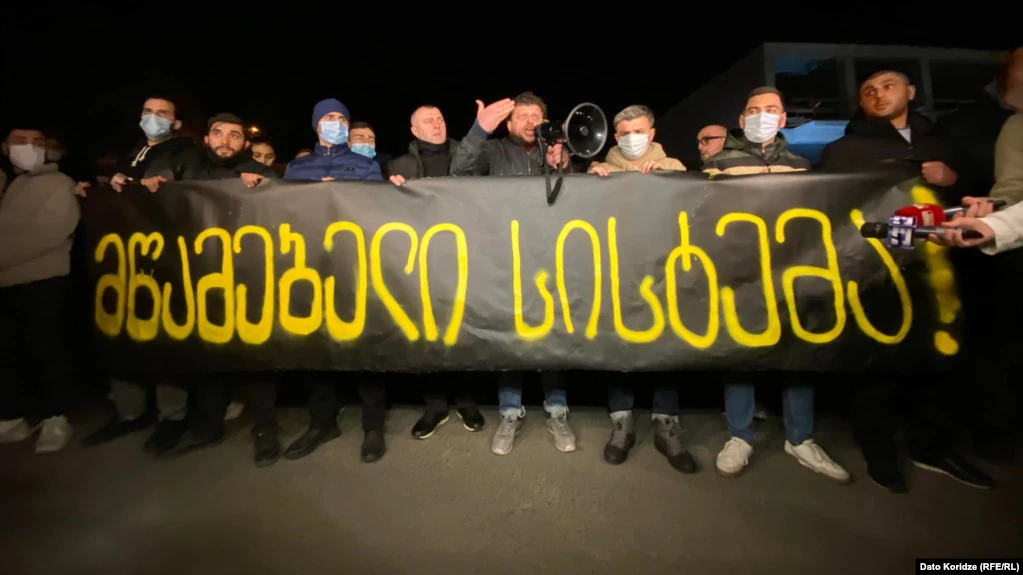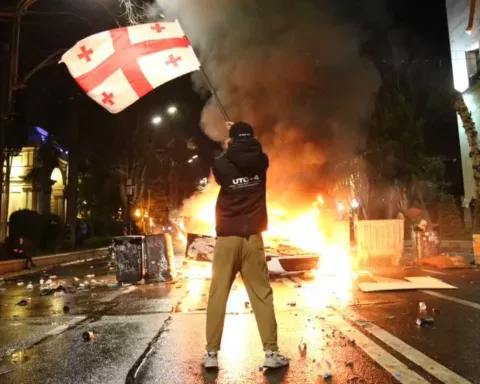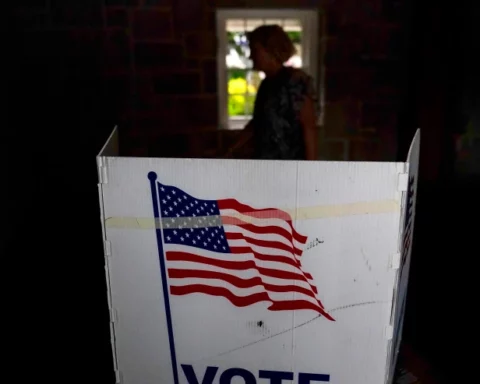Like other kids, the 17-year-old teenager was having a bit of fun at a subway station in the Georgian capital of Tbilisi, goofing around on the escalator.
Unlike most children, however, the boy was deaf and didn’t hear when police ordered him to stop, before grabbing and hauling him off to a small nearby room serving as a police office.
In what was reported to be eyewitness video uploaded to social media earlier this week, one of the two officers appears to punch and slap the boy, who tries to shield himself from the blows as the other policeman watches impassively.
The images have shocked many in Georgia, but not surprised those who monitor police abuse in the Caucasus nation of some 3.7 million.
“This is hardly an isolated incident of police brutality and a swift, thorough, and substantial response is needed by the authorities to address the persistent problem of lack of accountability for such abuses,” said Giorgi Gogia, an expert on the South Caucasus for Human Rights Watch, in written comments to RFE/RL.
One day after the incident in Tbilisi, more video emerged of further alleged police abuse in Georgia. This time in the western town of Zugdidi, where a police officer is alleged to have repeatedly punched a woman during a dispute.
All three implicated officers in the two incidents have been detained and charged amid a public outcry. On January 26, rallies against police brutality, organized by the opposition United National Movement, were held in Tbilisi, Zugdidi, Batumi, Gori, and Telavi.
While authorities were quick to act, in the past they have been accused of dragging their feet on investigating police abuse. So much so, that more than a dozen Georgians have turned to the Strasbourg-based European Court of Human Rights (ECHR) in past years to seek justice.
The foot-dragging could continue after the ruling Georgian Dream party was able to get parliament to pass legislation in December 2021 to abolish the independent body tasked with investigating police abuse, despite concerns from the West and international bodies, including Washington and the United Nations.
Two Incidents In Two Days
“He’s deaf-mute? What if I make him speak now? I’m going to make him speak now,” the officer is heard saying as he accompanies the teenager to a small office at the Isani subway station in Tbilisi on January 24.
Echoing what others were saying, Tamar Kordzaia, an independent member of parliament, wrote on Twitter: “#PoliceBrutality is widespread and getting worse every day.”
“Impunity for abuses by law enforcement remained a persistent problem,” Human Rights Watch said in its chapter on Georgia in its recent World Report 2022, adding 133 complaints of ill-treatment by prison staff or police had been reported to Georgia’s Ombudswoman’s Office in 2021.
The incident also highlighted the “systemic oppression” those with special needs face in Georgian society, said Giorgi Akhmeteli, president of the NGO Accessible Environment For All.
“There’s a feeling in society that they have the power to make disabled people walk, make deaf people talk, open the eyes of the blind. They often tell us: ‘Don’t use a wheelchair, you will get used to it, crawl and you will be able to stand…. I had the same feeling with this case — the policeman just couldn’t accept that the boy cannot talk,” Akhmeteli told RFE/RL’s Georgian Service.
A friend of the victim who witnessed the beating told the news website Tabula that the teenager was detained for sitting on an escalator handrail and that he was kicked by a police officer before the assault in the room began.
A day later on January 25 in Zugdidi, some 320 kilometers west of Tbilisi, the video footage emerged of a police officer beating a woman.
Identified only as G.B. who knew the woman, the officer had “repeatedly punched his friend in the face during a personal dispute,” a statement from the Prosecutor-General’s Office of Georgia reads, adding the officer had been arrested and charged with assault.
Seeking Justice Elsewhere
Frustrated by a lack of justice at home, many victims of alleged police brutality in Georgia have turned to the ECHR.
“Cases have been on the shelf for years, where there are cases of violence against citizens by police officers, and Georgia has already lost a number of cases in Strasbourg due to the fact that such cases are not effectively investigated here,” Eka Kobesashvili, a lawyer with the NGO, Human Rights House, told RFE/RL’s Georgian Service.
Between 2004 and 2021, the ECHR heard 14 cases concerning alleged police brutality and whether such cases had been properly investigated. In 12 of those cases, the ECHR found that authorities had failed to properly investigate the charges.

In 2019, the ECHR ordered the Georgian government to pay Nikoloz Goguadze 10,000 euros ($11,150) in compensation for the ill treatment he endured at the hands of police in Tbilisi in May 2011. The court ruled that Goguadze had been subjected to physical and psychological pressure to confess to being active in an alleged coup plot, the so-called Kintsvisi case, which government critics said was bogus as it was based on dubious claims with little if any evidence provided publicly. The claims of police abuse were not properly investigated by Georgian authorities, despite an eight-year probe into the matter.
One person whom Goguadze singled out was police investigator Mariani Choloiani. Apparently unsatisfied with his responses, Goguadze said, Choloiani would step out to make way for other officers who would then enter the interrogation room and beat him.
Choloiani would also figure in another case of alleged police abuse in December 2019 when Luka Siradze, a 15-year-old boy from Tbilisi, committed suicide by jumping from the ninth floor of his family’s high-rise apartment.
As in the case with Goguadze, Choloiani was alleged to have been a key member of the group of police who had interrogated Siradze for allegedly being part of a gang that had spray-painted expletives on buildings in the Georgian capital.
Unlike the Goguadze case, Choloiani was this time charged and found guilty of extracting a forced confession from Siradze. Sentenced to three years in prison, Choloiani was released in August 2021 after serving just half her sentence by the Special Penitentiary Service of Georgia “for exemplary behavior in prison.”
“She was probably told that she had to go to prison and that she would be released early. This is a clear example that members of the system can get away with anything, they have the right to do anything,” Luka Siradze’s brother, Beka Siradze, had told RFE/RL.
Police Abuse To Thrive?
Efforts to clean up the system recently suffered a setback, activists and others warned, when Georgian Dream used its majority in parliament to pass legislation to abolish the State Inspector’s Office, an independent body tasked with investigating police abuse.
The party introduced the bill on replacing the office — tasked with investigating offences by law enforcement, as well as personal data protection cases — with two new bodies on December 25, 2021.
In justifying the action, Mamuka Mdinaraze, a member of the Georgian Dream party, said investigative and personal data protection functions, unified under the former agency, were “not compatible.”

On January 13, the controversial bill was signed into law by Georgian President Salome Zurabishvili, despite appeals by NGOs and Western governments to reject it.
The abolition of “one of the most credible, independent, and authoritative institutions in Georgia” sent a “chilling” message to human rights-focused institutions in the country, the United Nations Country Team in Georgia said in a statement on January 14.
“It was done without consultations not only with civil society in Georgia and Georgia’s international partners, but even the [State] Inspector’s Office was not consulted in advance,” explained Gogia.
Among those critical of the legislation was U.S. Ambassador Kelly Degnan who said it “undermined government accountability.”
There still is a chance the move could be overturned. Georgian State Inspector Londa Toloraia said earlier this month that she will appeal against the move to the Constitutional Court of Georgia as well as the ECHR.





